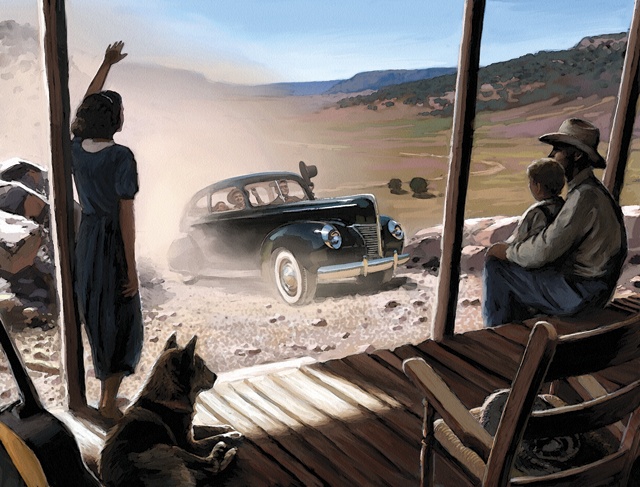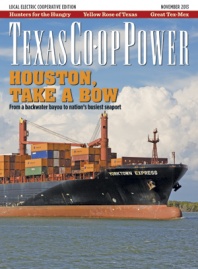Charles, get a chicken from the henhouse. Company’s coming!”
Mother would have the neck wrung and the chicken still flapping on the ground when the preacher’s car pulled up to our four-room, unpainted, tin-roof farmhouse. From our view atop a rocky hill in Coleman County (we belonged to Coleman County Electric Cooperative), it was easy to see the puff of dust miles away that alerted us to the preacher’s arrival. Our family of five might not have had meat all week, but company would be served the best we had. When the preacher and his family alighted from the car, Mother would say, “We’re having chicken for dinner. Will you join us?”
West Texas in the late 1940s and ’50s was regaining strength after the Great Depression, but our small tenant farming community was an exception. We still lived as we did in the Depression; the ravages of those times reflected in my parents’ gaunt, sad faces and lean bodies. Only our country church and taking our turn housing the preacher brightened our existence.
We were one of the 15 families who rotated the duty of providing the preacher and his family with weekend accommodations. He and his wife and daughter would arrive from Abilene on Saturday afternoon. We would sit down to large platters of fried chicken, fresh garden vegetables and homemade rolls followed by Mother’s special cinnamon rolls or sometimes angel food cake.
We tried to offer our best for the visit. Preparations always began the Monday before. We worked hard to make things look as clean and fresh as they could, but it was not easy. I had to give up my bed in the living room and instead sleep on a pallet in my parents’ bedroom. There was not a blade of green surrounding our house. The only flowers would be bluebonnets in the spring on the nearby hillsides. Our vista was miles and miles of rock and poor sandy soil. My brother and I would sweep the dirt around the house. The outhouse was about 40 yards away, and I designed a path with pebbles as my contribution for the preacher’s visit.
Windows were always open, making it difficult to keep the dust out. Mother had us dip the broom in kerosene before sweeping the gritty linoleum. If the preacher visited in the summer, there would first be wall repairs. After a West Texas winter, wind would blow through holes in the walls. Our remedy would be to flatten cardboard boxes and then nail them to the walls. Then we covered the repairs with heavy, flowery wallpaper applied using flour paste.
All our water was precious as we had to haul it on a flatbed trailer from a nearby tank. We all bathed in the same water in a No. 3 washtub with the water heated on the kerosene stove. That being the case, the preacher and his family would not bathe while they were with us. We could provide only a bowl of hot water in the mornings so the preacher could shave. The bowl was placed on my parents’ dresser because it held our only mirror. The dresser had been decorated with crocheted doilies Mother and I had starched in sugar water the week before and then molded around mixing bowls to form pretty shapes that sat upright.
The preacher’s wife had her own ritual. Before bedtime, she would whip four egg whites and apply them to her face. She was the product of Southern aristocracy and probably did not realize how precious those four eggs were to us. Of course, we were anxious to serve. She was one of the first women who demonstrated feminine primping rituals for this teenage admirer.
Sunday morning would mean another big feed for Mother to prepare, followed by the big Sunday lunch and afternoon supper. No matter how much food there was to prepare, we would arrive on time for services, where Daddy led the singing. Upon our return home, we served a noon meal, which usually consisted of a large roast from the calf Daddy had killed in the spring and vegetables that had been slowly cooking in the oven during our two-hour church service.
Everyone napped after the abundant meal. Afterward, Mother would serve leftover roast sandwiches on homemade light bread. Then we rode back to church on the 4 miles of dirt roads to attend the evening service. When we got back home, sometimes Daddy, who taught himself the guitar and violin, would play music for us—that is, if it wasn’t too hot on the front porch.
In addition to preparing the weekend meals, we would pack boxes of extra food for the preacher to take home for the week. Daddy always killed two hogs in December in addition to the calf in the spring. Whatever we had available in meat and in vegetables from the garden we shared and sent home with the preacher and his family, even Mother’s delicious pies. Money was scarce at our house, and this was part of our church offering.
I will always remember the preacher visits as special and endearing. That same Church of Christ preacher and his wife later helped me get into college and helped me find a job. Several years later, he married my husband and me in the University Baptist Church in Abilene, enabling us to have music and a piano, which were not allowed in our country church. The preacher’s visits provided me a window to the future as well as a break in our Depression-era existence.
We did not have much growing up, but we had heart. We also had structure, and we had responsibility modeled for us daily. I learned the opportunity and value that an education could provide. And I learned that although our resources were slim, a love for family, church and community would give me the foundation I needed for life.
——————–
Betty Calcote, a retired teacher, lives in Georgetown.


